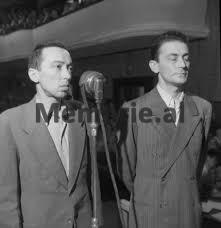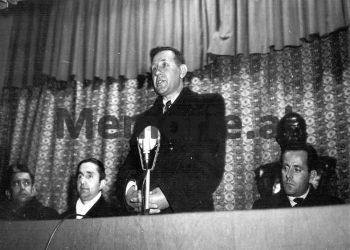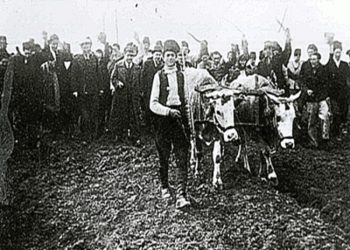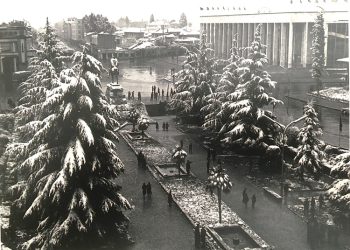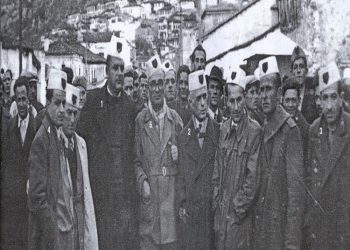Dashnor Kaloçi
The fourth part
Memorie.al/ publishes some archival documents extracted from the Archive of the Ministry of Internal Affairs which belong to the investigative and judicial file of the so-called “Group of Deputies”, which included 24 defendants and among them names and well-known personalities of during the Anti-Fascist National Liberation War and then deputies of the Albanian Parliament or in the Presidency of the Democratic Front of Albania headed by Colonel-General, Enver Hoxha, as Shefqet Beja, Dr. Enver Sazani, Sheh Ibrahim Karbunara, etc., who were brought before a military court headed by Major Niko Çeta and prosecutor Josif Pashko.
What were the accusations formulated by the trial panel against the 24 defendants: Shefqet Beja, Enver Sazani, Sheh Ibrahimi (Karbunara), Selaudin Toto, Irfan Majuni, Tefik Deliallisi, Hysen Shehu, Salim Kokalari, Sulo Konjari, Ramazan Tabaku, Gjovalin Vlashi , Rustem Sharra, Xhevat Xhafa, Rram Marku, Beqir Çela, Riza Alizoti, Sulo Klosi, Saggioti Paolo, Foto Bala, Abdyl Kokoshi, Shefki Minarolli, Pertef Karagjozi, Mehmet Prishtina and Agathokli Xhitoni?
What did the defendants of the “Parliamentary Group” testify during the investigative and judicial process, regarding: their organization, the branches they had in different districts of the country, the people who headed them, the connections with the anti-communist resistance groups that were on the run, or nationalist exponents of Balli and Legality who were in the Italian camps, the support they had from the Anglo-Americans and their missions operating in Albania, the connections with senior senior military of the Ministry of National Defense and that of Internal Affairs, and to people with high functions, near Enver Hoxha, etc.
The documents we are publishing in this article belong to the judicial and investigative file of the so-called “Group of Deputies” who were arrested and taken as defendants by the communist regime of Enver Hoxha, being placed in the dock of the accused in early September. 1947. In that trial which took place in the Cinema “17 Nëntori” of the capital from 4 to 27 September, when the claim was given, 24 people were tried as defendants, most of whom were well-known personalities. of the Antifascist National Liberation War.
Most of them were well-known intellectuals who had graduated from Western universities and some of them, such as Shefqet Beja, Enver Sazani and Sheh Ibrahim Karbunara, were members of the Albanian Parliament, nominated as candidates of the Democratic Front led from the Communist Party led by Enver Hoxha.
Apart from these three very well-known nationalists and very popular all over the country, who were the leaders of that group of defendants, known as the “Group of Deputies”, a large part of them were anti-Zogists and had supported or had taken an active part in the Anti-Fascist National Liberation War. Also, in that group were other intellectuals and various merchants, who had not joined any of the three political forces (Balli, Legality and the Communist Party) during the war, but who had frozen and embraced liberal ideas. -democrats of Western countries where they had studied, having strong anti-communist tendencies.
The trial of the “Group of Deputies” which began with a great pomoz by the propaganda of the communist regime, making available its entire arsenal of radio, newspapers and posters pasted on the walls, in terms of size and importance of his, was the second largest process developed up to that time since the end of the War. The first trial took place in March 1945, known as the “Special Trial against War Criminals,” and at the dock of that trial, 64 people appeared, most of them holding senior positions. in all Albanian governments from that of Ismail Qemali, to those under German occupation, such as deputies, prime ministers, ministers, prefects, mayors, ambassadors, senior military, etc.
Unlike the Special Court of March 1945, where all those persons whom the communist regime of Enver Hoxha had declared as “enemies and war criminals” were tried as defendants, the trial of the Group of Deputies, which began on September 4, in 1947, there was an even greater political and social burden, and of extraordinary interest, as some of the personalities who had joined the ranks of the Democratic Front, led by the newly ruling Communist Party, were tried there.
From various testimonies obtained from the family members of the “Group of Deputies”, as well as from the former military of the Ministry of Interior of that time, almost all the defendants of that group, during the investigation process were subjected to torture by the most inhuman in order to accept the accusations leveled against them by the investigators. It is clearly seen from the court file of that process, where some of the defendants during their trial denied the evidence they gave during the investigation, saying: “We were not able and we signed them.”
In addition to those testimonies denied in that trial, there is much other evidence by the defendants in that trial, which speaks of their anti-communist activity and activity, starting from the period of the War until the time they were arrested. , where Sheqet Beja, Enver Sazani, Ibrahim Karbunara, Hysen Shehu, Tefik Deliallisi, Sulo Kloso, Salim Kokalari, Beqir Çela, etc., have accepted all their activity aimed at overthrowing the Communist Government of Enver Hoxha. Also, in that court file it is seen that the defendants have admitted their connections and cooperation with the Anglo-American missions led by Harry Fultz and General Hodgson, as well as the connections with the main nationalist exponents of Balli and Legality, who were in exile or in fled through the mountains.
In addition to the many testimonies made by the defendants of that trial, (always referring to the file in question), which show their connections and anti-communist activity to overthrow the communist regime, one of the most interesting testimonies in that trial is that made by Tefik Deliallisi, where he tells about the conversation made at the house of Ymer Keçi in Tirana, where Ymeri charged Hamdi Kacolles, (the man who served next to Myslym Peza) with the assassination of Colonel-General, Enver Hoxha and Koci Xoxa, during the visit that they would do in Peza.
Although Memorie.al has the entire court file of this group, which consists of 173 typed pages and has been extracted from the Archive of the Ministry of Internal Affairs, we decided to publish only some of its main parts, giving those in the original version, as they appear in the relevant file.
Minutes of the trial of the “Group of Deputies”
Judging Court
Chairman: Major Niko Çeta
Member: Captain I, Nexhat Hyseni
Captain II, Mustafa Iljazi
Chief Secretary: Aspirant Thoma Rino
Prosecutor: Deputy General Prosecutor, Josif Pashko
Defendants
- Shefqet Beja
- Enver Sazani
- Sheh Ibrahimi (Karbunara)
- Selaudin Toto
- Irfan Majuni
- Tefik Deliallisi
- Hysen Shehu
- Salim Kokalari
- Sulo Konjari
- Ramazan Tabaku
- Gjovalin Vlashi
- Rustem Sharra
- Xhevat Xhafa
- Rram Marku
- Beqir Çela
- Riza Alizoti
- Sulo Klosi
- Saggioti Paolo
- Photo Bala
- Abdyl Kokoshi
- Shefki Minarolli
- Pertef Karagjozi
- Mehmet Prishtina
- Agathokli Xhitoni
Followed by the last number
Indictment
Deposits of Paolo Saggioti: “Refinery burning in Kuçova”
The testimony of the Italian Saggioti continues: We have organized the Italian staff so that they are ready and we have also formed groups of clerical and technical staff. The committee consisted of Tarasco, Katie, me and Don Pietro and each of the chairpersons of the main groups was tasked with leading the respective group in the sabotage affairs. We would propagandize to the personnel for slowing down and sabotaging the works and propagandizing against the Government. I had the manufacturing sector. The secret archive seems to me to have passed into the hands of Dom Peter. This archive had the correspondence kept by the engineer Tarasconi himself, and which were important matters that had nothing to do with ordinary correspondence. I do not know what it contained.
Engineer Tarasconi came to Tirana in November 1944 to meet with the English Mission and to reach an agreement with the head of the Italian agendas in order to coordinate the affairs and try to save their agendas. When he returned from Tirana, Tarasconi told me that he had informed the British about everything that was going on in Kuçova and that he had talked to all the directors of agendas in Albania in order to coordinate the work. He met and talked with Simoncini and others, and their goal was to cooperate all the agendas and in the defense of the Anglo-Americans to try to save the Italian wealth in Albania.
Tarasconi from Tirana brought 150 napoleons of gold, which were distributed among the staff and a part was kept by Tarasconi for eventual needs. I got 25 gold napoleons. On December 24, we decided to sabotage distillery no. 2 according to the suggestions of the English. The sabotage would be done so that on one side the fire was put on the other side gasoline was spilled so the fire would go down to the distillery.
We were informed of the burning by the English, who informed us to wait until they informed us of the day, which they set in mid-January, and informed us by Simonchin. At first we thought of burning the fuel waste that had come out and so the fire would reach the distillery where the gas pipes would open and the fire would spread.
This fire was put out but extinguished with the help of the workers; of the soldiers and the commissar who went to the place faster. Actions in general mainly according to the instructions of the English but this was a case that came up instantly and we acted. At this time in Kuçova Tarasconi and Kati were arrested and on the occasion of their arrest we were very scared.
Later some others were arrested but we continued our activity. We also had engineer Riza Alizotin, who came to Kuçova in November and participated in the group after arriving there. Our group also included Professor Zyber, Doctor Dakua, and Engineer Sulo Klosi.
“Group connections with the Center in Bari”
On the question of the Prosecutor the defendant said:
We put Engineer Riza Alizoti in the lead after he was recommended by the English mission. After Tarascon, he took over all the work. Engineer Alizoti was the general manager in the direction of the works. Tarasconi came to Tirana in November and brought a broadcast radio, which he had received from the English mission; by means of which we came into contact with the Bar. This was first used by Tarasconi himself and then by me. We had placed the radio in the basement of the house and it passed in two or three hands both in the hospital and elsewhere. By this we connected with Bar. Tarasconi and Alizoti maintained ties with Tirana.
The information we gave through the Radio was about the work being done in Kuçova and about our situation. They informed us that the situation in Albania would change with the help of the Anglo-Americans and that we would continue to keep in touch with the missions in Tirana. Engineer Tarasconi as he took the radio from the English mission, made a letter and sent it to it was small but it was finishing our work. Before the radio reached me, Radio Bari announced the hours when we would broadcast. We kept the radio until September and then destroyed it after Bari informed us that the situation was being clarified since the peace treaty was being made.
Engineer Klosi came to Kuçova in the month of Fruer 1945 and since then he has continued to come often. He attended a meeting in March. Water wells were destined to be built in areas where there was no or little water, as this type of work, which, among other things, had a propaganda purpose, was not carried out. After Tarascon and Katie the caretaker of the house and another were arrested. With the arrest of Tarascon, two people in charge of the Committee came to Tirana to inform Simoncin and General Piccin who was here.
On this occasion the British informed us that the work of sabotage had to continue as before. We kept in touch with the English mission until September 1945 and then we got in touch with the American mission. We made the first attempts with the Americans through the mediation of Engineer Riza Alizoti in July and August 1945. We connected with Fultz, with whom we had verbal contacts with Engineer Alizoti and Professor Xyber. In August 1945 we sabotaged water wells, distilleries, reconstruction and other sectors.
The testimony of Dr. Enver Sazanit
Today, on the appointed day and time, the Council was formed as before, assisted by the Aspirant Chief Secretary Thoma Rino, and with the present presence of the Prosecutor Josif Pashko.
Accompanied regularly the defendants were brought from prison and being free were placed in the special place, thus the trial began regularly and worldwide.
The defendant Enver Sazani was interrogated, he was appointed as defense counsel Mr. Spiro Stringa, and accepted.
The indictment of the Prosecutor was sung to you and he said that he accepts it.
After being asked, he stated:
I started the activity against the people at the end of July 1945. Earlier I talked to Shefqet Beja and Salim Kokalari, who have appeared against me against the Government. At the beginning of 1945, Shefqet Beja, Salim Kokalari, and Sulo Konjari came to my house, who proposed me to form an organization against the Front. This activity had started since the Congress of Berat, but I was told in July 1945. When I left the army and being sick for a few days came Shefqet Beja, who knowing that I was desperate to leave that they did to me, he said to me: this is what power does and he started talking to me against him.
The first meeting I attended took place at the house of Tefik Deliallis in July 1945, and was attended by: Shefqet Beja, Kol Kuqali, Kosta Boshnjaku, Salim Kokalari, Selaudin Toto, me, Hysen Shehu and Tefik Deliallis, here he spoke Shefqet Beja, who said that Riza Dani was related to the fugitives and that the fugitives were seeking help; on this occasion Kol Kuqali said that the Anglo-Americans have promised us help but we need to organize and expand the ranks.
The presidency was formed here with Kostë Boshnjaku as chairman, and Shefqet Beja and Kol Kuqali as vice-chairman, and Selaudin Totua as secretary. I was assigned to work with doctors and other elements that I could afford. The purpose of creating this organization was to overthrow the government with the help of the Anglo-Americans and the help of the fugitives./Memorie.al
Continues tomorrow




